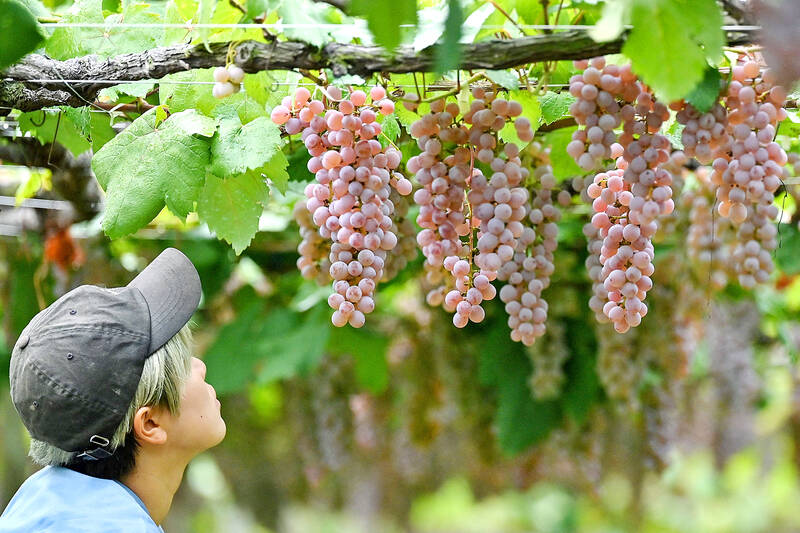At a Buddhist temple on a wooded hillside in Japan, grapes and wine bottles are given as offerings, and the head monk is also the honorary president of a vineyard cooperative.
Officially, it is known as Daizenji, but it has been nicknamed the “grape temple” because of its deep-rooted links to the history of grape production in the country.
Daizenji is in Yamanashi Prefecture, about 100km west of Tokyo, which is famous as the home of Mount Fuji, and more recently as Japan’s top winemaking destination.

Photo: AFP
“At other temples, they offer sake, but here, we offer wine. That’s unique in Japan,” head monk Tesshu Inoue, 75, said as he recounted the mythic origins of his temple.
In 718 AD, a famous Japanese Buddhist monk and traveler called Gyoki is said to have met the Buddha of medicine, known in Japanese as Yakushi Nyorai, in a dream at the spot where the temple stands today.
In his hand, Nyorai held a bunch of grapes — inspiring Gyoki to found Daizenji and establish the local vineyard culture, teaching Yamanashi residents how to make wine for medicinal purposes.
A different legend claims farmer Kageyu Amemiya was the first to begin the cultivation of grapes in Japan, in the same area, but more than 450 years later, in 1186.
DNA analysis has found that koshu — the oldest grape variety grown in the mountainous region — is a hybrid of a vine species originally cultivated in Europe and a wild Chinese vine.
That suggests it could have traveled the Silk Road on its way to Japan, the same way Buddhism established itself in Asia.
The Web site for Yamanashi’s “koshu valley,” supported by the local chamber of commerce, suggests seeds or vines from China might have been planted in the grounds of temples and rediscovered by chance much later.
However, it was only in the Meiji era from 1868 to 1912 — a period that saw an explosion in interest in the Western world — that wine production started in Japan.
With its fertile soil and long history of grape growing, Yamanashi was the obvious choice for the first vineyards, and even today, Daizenji is surrounded by grapes growing on pergola structures.
At the altar, grapes and bottles sit as offerings, while a small shrine conceals an antique cherrywood statue of Yakushi Nyorai with his famous bunch of grapes.
The lacquered sculpture, decorated with gold leaf, is a precious artifact belonging to the temple, and is only shown in public every five years.
Daizenji also sells its own grapes, and bottles of wine bearing the temple’s name. “Growing grapes, making wine, it’s a good deed,” Inoue said with a smile. “It’s good karma.”

Ukraine’s military intelligence agency and the Pentagon on Monday said that some North Korean troops have been killed during combat against Ukrainian forces in Russia’s Kursk border region. Those are the first reported casualties since the US and Ukraine announced that North Korea had sent 10,000 to 12,000 troops to Russia to help it in the almost three-year war. Ukraine’s military intelligence agency said that about 30 North Korean troops were killed or wounded during a battle with the Ukrainian army at the weekend. The casualties occurred around three villages in Kursk, where Russia has for four months been trying to quash a

FREEDOM NO MORE: Today, protests in Macau are just a memory after Beijing launched measures over the past few years that chilled free speech A decade ago, the elegant cobblestone streets of Macau’s Tap Seac Square were jam-packed with people clamouring for change and government accountability — the high-water mark for the former Portuguese colony’s political awakening. Now as Macau prepares to mark the 25th anniversary of its handover to China tomorrow, the territory’s democracy movement is all but over and the protests of 2014 no more than a memory. “Macau’s civil society is relatively docile and obedient, that’s the truth,” said Au Kam-san (歐錦新), 67, a schoolteacher who became one of Macau’s longest-serving pro-democracy legislators. “But if that were totally true, we wouldn’t

ROYAL TARGET: After Prince Andrew lost much of his income due to his friendship with Jeffrey Epstein, he became vulnerable to foreign agents, an author said British lawmakers failed to act on advice to tighten security laws that could have prevented an alleged Chinese spy from targeting Britain’s Prince Andrew, a former attorney general has said. Dominic Grieve, a former lawmaker who chaired the British Parliament’s Intelligence and Security Committee (ISC) until 2019, said ministers were advised five years ago to introduce laws to criminalize foreign agents, but failed to do so. Similar laws exist in the US and Australia. “We remain without an important weapon in our armory,” Grieve said. “We asked for [this law] in the context of the Russia inquiry report” — which accused the government

TRUDEAU IN TROUBLE: US president-elect Donald Trump reacted to Chrystia Freeland’s departure, saying: ‘Her behavior was totally toxic, and not at all conducive to making deals Canadian Deputy Prime Minister Chrystia Freeland on Monday quit in a surprise move after disagreeing with Canadian Prime Minister Justin Trudeau over US president-elect Donald Trump’s tariff threats. The resignation of Freeland, 56, who also stepped down as finance minister, marked the first open dissent against Trudeau from within his Cabinet, and could threaten his hold on power. Liberal leader Trudeau lags 20 points in polls behind his main rival, Conservative Pierre Poilievre, who has tried three times since September to topple the government and force a snap election. “It’s not been an easy day,” Trudeau said at a fundraiser Monday evening, but